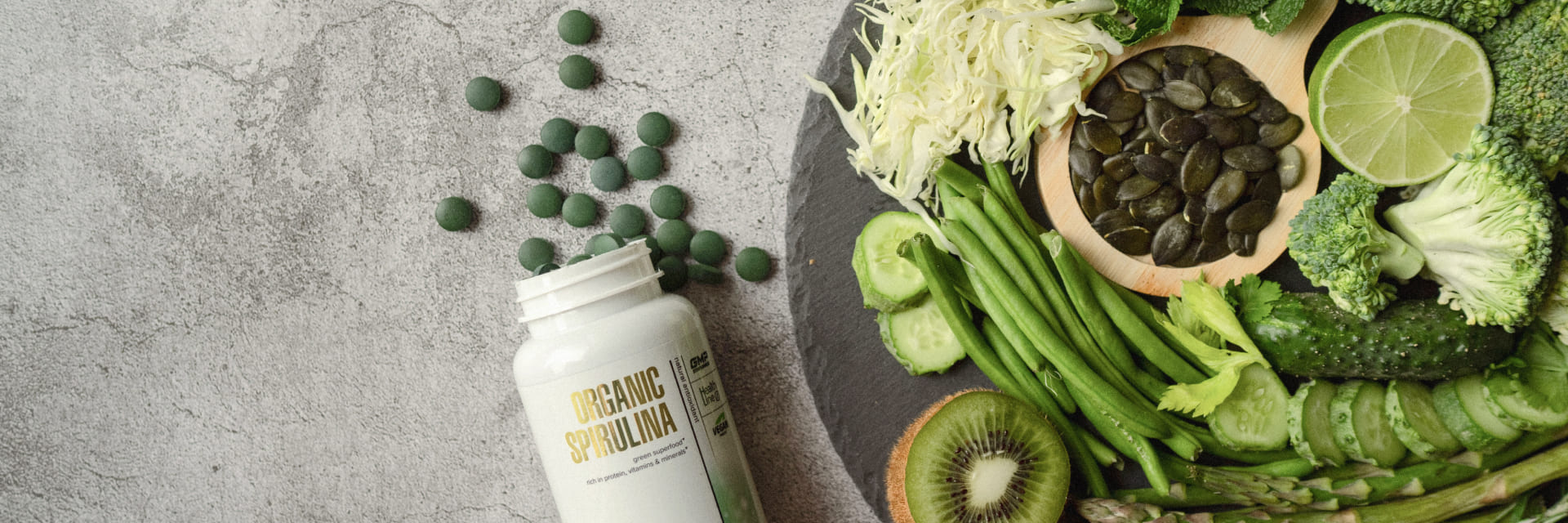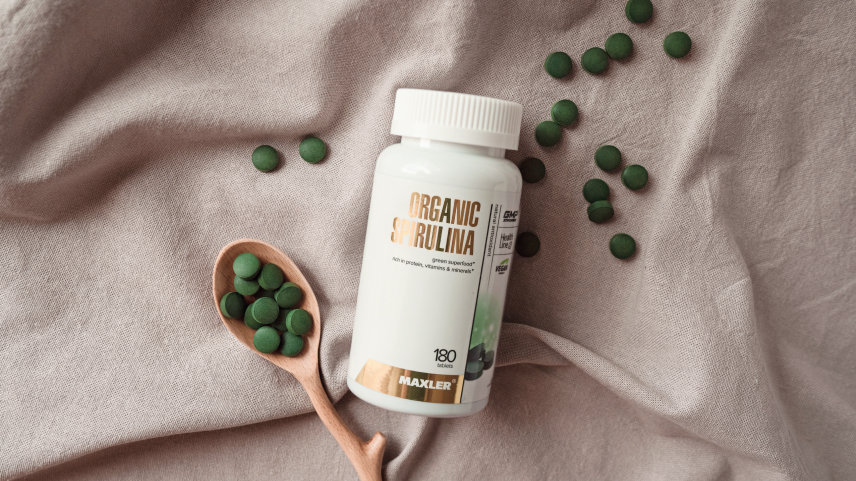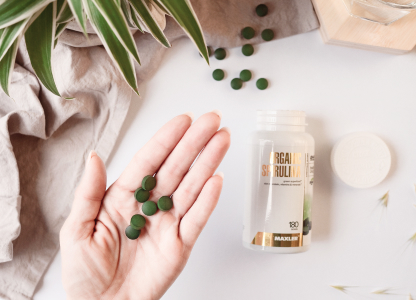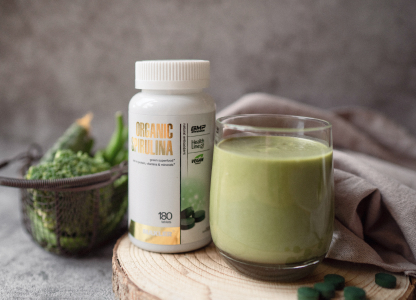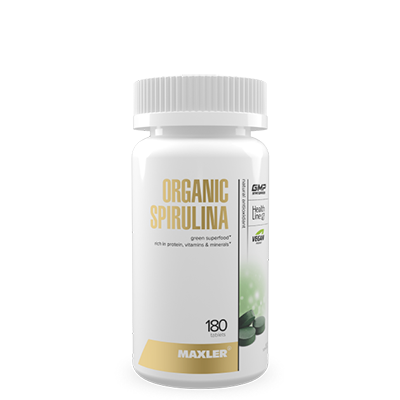Spirulina is a single-celled microalgae growing in water. It has been used as a food source for centuries but has recently become popular as a superfood. Apparently, some African communities have used it as their sole food source in times of famine. In 1974, the United Nations named spirulina one of the best foods for the future, and even scientists from the Space Program at NASA have studied spirulina as a potential food source for space travel!
So, what makes spirulina so remarkable?
An exceptional source of nutrients
Spirulina is about 60% complete, easily digestible protein containing all essential amino acids. It is high in all group B vitamins, as well as vitamins A (beta-carotene), E, K1, and K2. It has a varied mineral profile, containing calcium, iron, phosphorus, iodine, magnesium, zinc, selenium, copper, manganese, chromium, sodium, and potassium.
It also contains important phytonutrients and carotenoids. Carotenoids act as antioxidants and can decrease the risk of diseases like cancer and eye disease. Phytonutrients are bioactive compounds found in plants that help to prevent disease and support health.
Important phytonutrients in spirulina include gamma linoleic acid (GLA), which is an omega-6 acid that can reduce inflammation. Another phytonutrient is zeaxanthin, which can help protect the body against oxidative stress and is key in protecting against age-related macular degeneration and cataracts. Finally, it contains chlorophyll and phycocyanin, which has been shown to have anti-cancer properties.
To understand just how incredible spirulina’s nutrient profile is, let’s compare it to other foods
Spirulina contains:
- 180% more calcium than whole milk
- 670% more protein than tofu
- 3100% more beta carotene than carrots
- 5100% more iron than spinach
Therefore, it is no surprise that spirulina is becoming a highly researched supplement for human health. What have studies found out about spirulina?
Spirulina is a potent immune system activator
Spirulina has been shown to have immunoregulatory activity. It has been shown to enhance resistance to infections in humans, mammals, chicken, and fish. Hot water extract of spirulina has been shown to increase natural killer cell functions and interferon production. Natural killer cells are responsible for killing virally infected cells and detecting early signs of cancer. Interferons are the body’s first line of antiviral defence, and they signal to the body that it is under viral attack.
Japanese scientists have isolated a polysaccharide from spirulina named calcium spirulan. This polysaccharide has been shown to stop replication of several viruses like herpes, measles, mumps, influenza, and HIV-1. Preliminary test tube studies are suggesting that spirulina may be an effective supplement to help manage COVID-19, however, the research is currently very limited and clinical trials have not yet been conducted.
Therefore, spirulina might be a great supplement to take during the cold and flu seasons to give your immunity that extra boost.
Spirulina can help manage allergies
Spirulina contains phycocyanin, which has been shown to reduce allergic inflammation through decreasing IgE antibodies, which are overproduced when the body senses an allergen.* An increase in IgE antibodies leads to the activation of cells that release chemicals causing an allergic reaction. Another study has shown that spirulina can decrease allergic rhinitis, which is a blocked or runny nose due to allergies.
Therefore, if you suffer from allergies, spirulina might make it easier to manage your condition.
Cardiovascular and blood-sugar management benefits
Cardiovascular diseases affect the heart or blood vessels, and are associated with a build-up of fatty deposits, increased risk of blood clots and damage to arteries in key organs. While they affect many people, cardiovascular diseases can be prevented by leading a healthy lifestyle.
Spirulina has been suggested to have a beneficial effect in preventing cardiovascular diseases.* Studies have found that it can decrease blood pressure and fats in blood, especially low-density lipoprotein cholesterol – the “bad” form of cholesterol. These effects are likely due to the presence of GLA and phycocyanin, which decrease cholesterol absorption. Studies have shown that spirulina and phycocyanin from spirulina can help manage cardiac side effects from chemotherapy drugs and can help protect from damage during heart attacks. These studies also suggest spirulina can help with recovering from a heart attack.
A clinical study has found reductions in bad to good cholesterol ratio in diabetic patients. A few studies have found that spirulina may help control blood glucose levels and improve lipid profile in those that suffer from type 2 diabetes.
Other benefits of spirulina
You might be surprised, but the benefits of spirulina don’t end here. There are a few other benefits that have been highlighted:
- A study has shown that spirulina can help manage exercise induced increases in oxidative stress and inflammation.
- Several clinical and preclinical trials have shown that spirulina is beneficial for weight loss and can help boost basal metabolism.
- A study has suggested spirulina can help preserve healthy gut bacteria during ageing.
Spirulina has a variety of benefits, from ensuring you get your daily dose of vitamins and minerals, to helping prevent cardiovascular diseases and manage allergies. If you’d like to try supplementing spirulina to boost your health, look no further than Maxler Organic Spirulina. Maxler Organic Spirulina is vegan and contains 1500 mg of spirulina per serving. Maxler Organic Spirulina tabs contain only two ingredients – spirulina and magnesium stearate, which prevents the tabs from sticking to each other. This way you can be sure that you can get lots of the bioactive product without any unnecessary extras.
*These statements have not been evaluated by the Food and Drug Administration. The product is not intended to diagnose, treat, cure or prevent any disease.The information provided on this site is intended for your general knowledge only and is not a substitute for professional medical advice or treatment for specific medical conditions. Always seek the advice of your physician or other qualified healthcare provider with any questions you may have regarding a medical condition.
